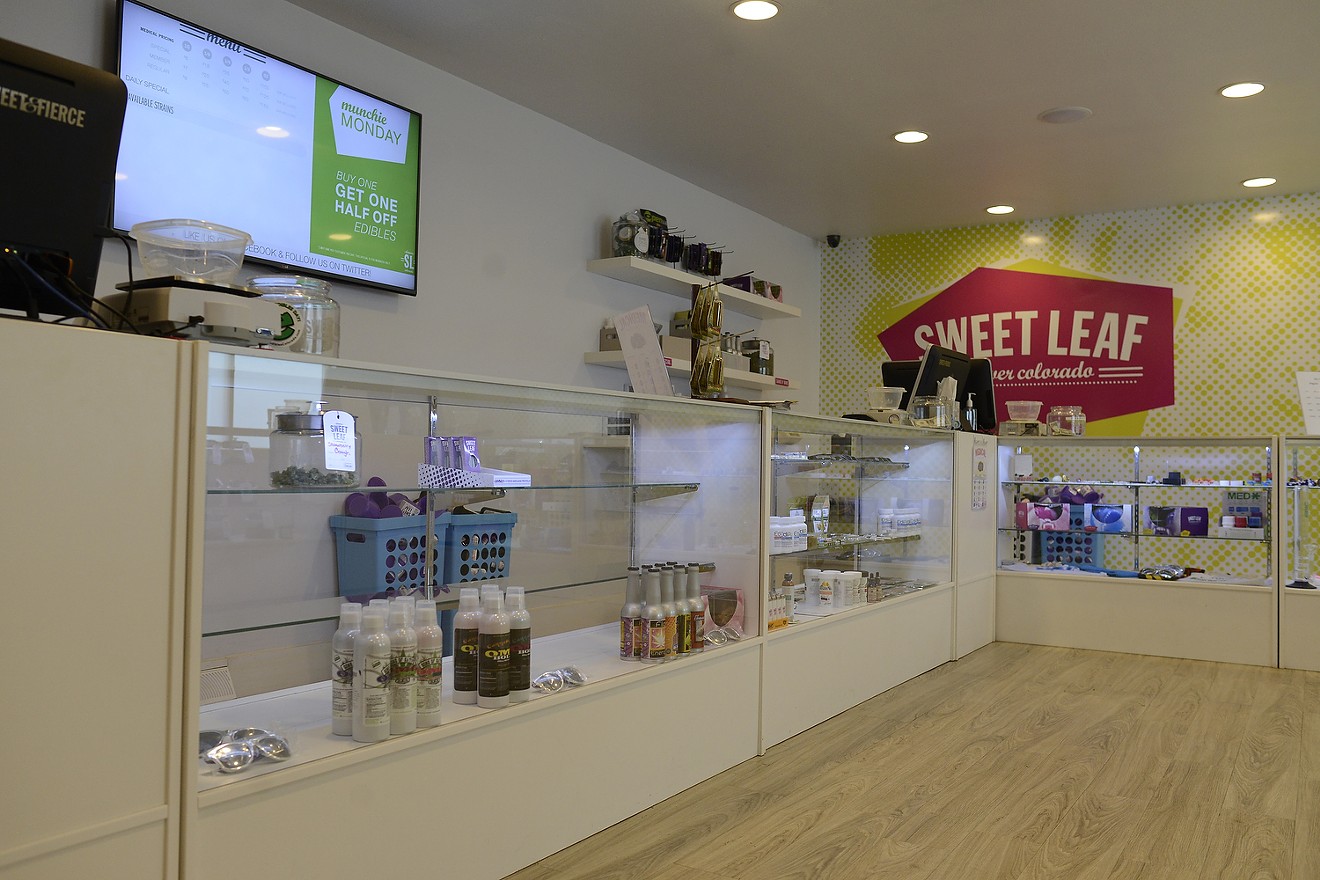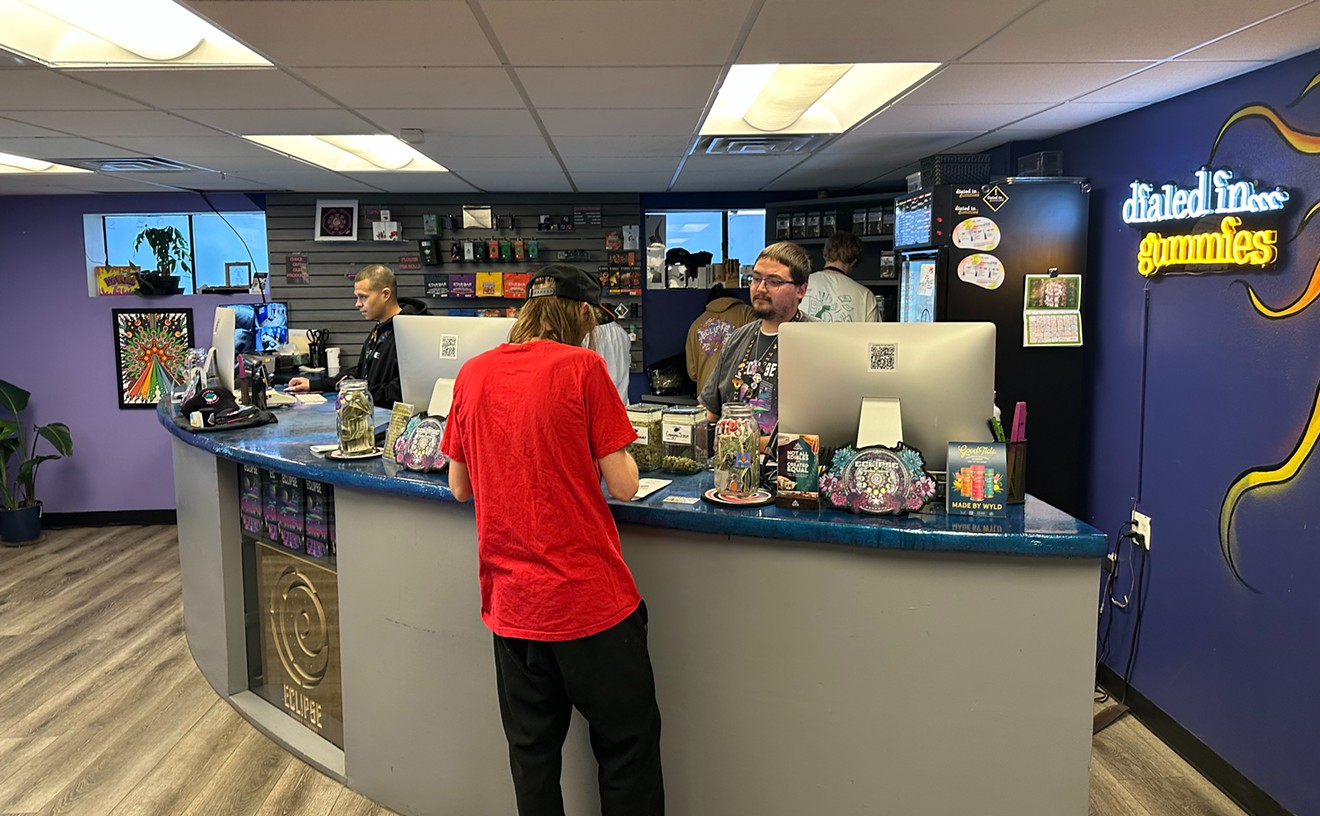The gritty battle over Sweet Leaf's future in Denver carries no criminal charges, but the company's 26 cannabis cultivation, dispensary and infused-product licenses within city limits could all be revoked based on what city hearing officer Suzanne Fasing recommends to Denver Department of Excise and Licenses director Ashley Kilroy, who will ultimately decide Sweet Leaf's fate. Those 26 business licenses are all currently suspended.
The fight stems from a yearlong Denver Police Department investigation into alleged illegal cannabis sales at Sweet Leaf dispensaries across Colorado, including locations in Aurora and Federal Heights that reopened shortly after a string of DPD raids in December 2017. Denver's locations have not reopened since the raids. City attorneys argue that Sweet Leaf management and ownership implemented a structure to promote looping, or selling the one-ounce limit (two ounces for medical patients) to the same customer multiple times in the same day. The one-ounce limit was established by Amendment 64, but language distinguishing whether that limit was per purchase or per day was cloudy until a new law took effect on January 1.
As a result of the raids, fifteen current and former Sweet Leaf budtenders were arrested; their cases are all in pre-trial phases. None of the company's owners listed in the Excise and Licenses suspension order — Anthony Sauro, Christian Johnson and Matthew Aiken — have been arrested, nor have executives named in Sweet Leaf employee interviews conducted by the DPD.
Sweet Leaf's attorneys agree that what the company was doing is currently illegal in Colorado and even offensive to the industry, but according to attorney Tom Downey, his client's actions were legal during 2016 and 2017 and didn't become unlawful until a new law took effect on January 1, 2018. The dispensary chain and Downey believe the previous language of the law tied the one-ounce limit to individual transactions, not accumulative transactions each day.
"All of this could've been stopped after one phone call after the city got a complaint from the neighbor," Downey told Fasing during his closing argument. "As I citizen, I'm with you. I hated it. However, they should've changed the law."
But city attorneys believe a statement of position by the state Marijuana Enforcement Division in May 2017 cleared up any confusion about how the state interpreted the law regarding one-ounce sales. City Attorney Susan Cho told Fasing that the statement was reiterated to Sweet Leaf vice president Nichole West in an MED email in August 2017.

A sign at Sweet Leaf's Walnut Street dispensary announces the store's license suspension on Thursday, December 14.
Thomas Mitchell
On top of those startling sales figures and examples of arrested loopers at each Sweet Leaf dispensary in Denver, city attorneys presented hours of DPD testimony and body-cam footage of undercover buys during the hearing, as well as instant messages between Sweet Leaf managers discussing looping tactics to increase sales. Downey didn't attempt to deny any of the "gazillion instances" shown by the city. "We have heard a whole lot of evidence over and over again," he said during the hearing. "But where is it written that that is illegal?"
"The bottom line is that the law didn't go into effect until this year," Downey added. "There was a gaping hole in the law here. Our folks knew where the line was, and they drove right up to it."
To help its case against Sweet Leaf, city attorneys have tried to convince Fasing that a theory of complicity applies to Sweet Leaf, arguing that the company was complicit in loopers breaking Colorado's cannabis possession laws, which allows adults 21 and older to posses no more than one ounce of cannabis, with medical marijuana patients allowed to possess up to two ounces.
Downey pointed out that a couple of months ago, the charges filed against the budtenders were changed from distribution charges to possession with intent to sell, but the city has failed to amend its charges against his client in a similar fashion. He called the city's distribution charges against Sweet Leaf a "fatal flaw" in its case. "The only hope they have is the complicity theory, and they've mis-charged it," he told the hearing officer.
However, Cho and Jankovic argued that the budtenders' willingness to sell again to the same customers in under five minutes, as well as the company leadership's alleged directive to continue selling to loopers, are more than enough to prove complicity. "What the evidence has shown is that deniability is anything but plausible," Jankovic concluded.
Fasing is now considering her recommendation; Excise and Licenses officials and Sweet Leaf attorneys expect it to be made within approximately thirty days. Upon receiving her recommendation, Kilroy will decide whether to revoke, suspend or reinstate each of Sweet Leaf's 26 cannabis business licenses in Denver.












